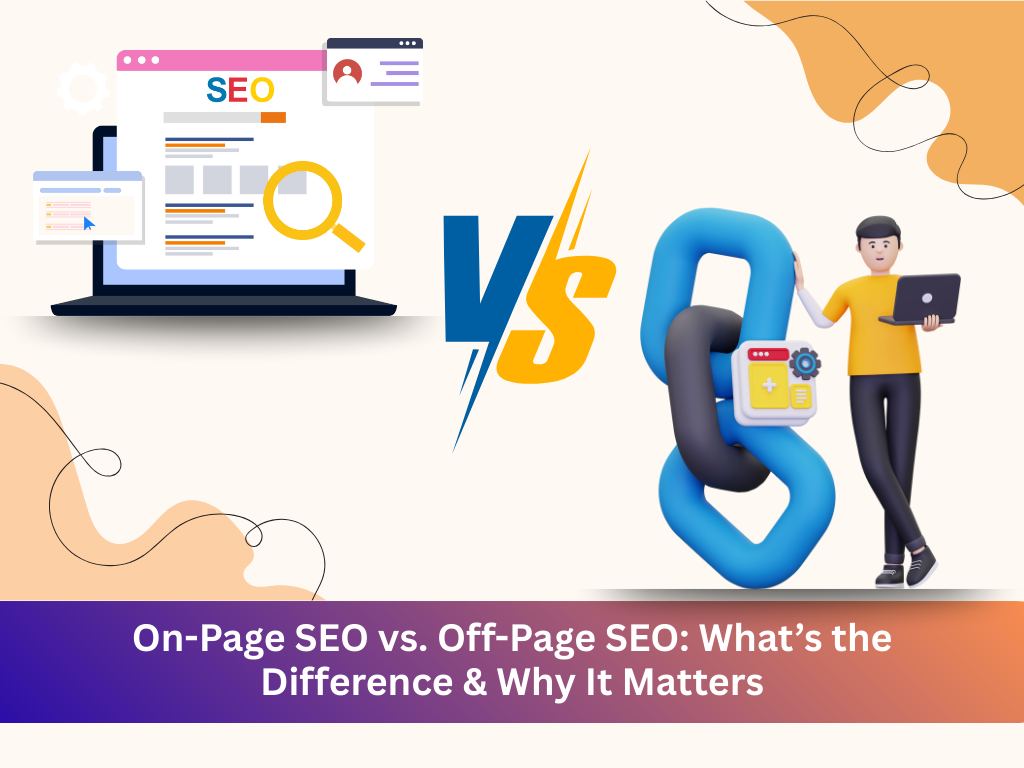
Search Engine Optimization (SEO) is the backbone of digital visibility. But within SEO, there’s often confusion between On-Page SEO and Off-Page SEO—two essential components that work hand-in-hand to improve your rankings and reach.
In this blog, we break down the key differences between the two, explore why both matter, and show how to create a winning strategy that covers all your SEO bases.
What is On-Page SEO?
On-Page SEO refers to the optimization you perform on your website to make it more search engine-friendly and user-focused.
Key Elements:
- Title Tags & Meta Descriptions
- Header Tags (H1, H2, H3, etc.)
- Keyword Optimization
- Image ALT Text
- Internal Linking
- URL Structure
- Mobile Responsiveness
- Page Speed
- Content Quality and Relevance
Why It Matters:
On-page SEO ensures your site is readable and relevant to both users and search engines. It improves content discoverability, drives organic traffic, and creates a better user experience.
What is Off-Page SEO?
Off-Page SEO focuses on building authority and trust through actions outside your website.
Key Elements:
- Backlinks (from reputable websites)
- Social Media Signals
- Guest Blogging
- Brand Mentions
- Influencer Outreach
- Online Reviews and Ratings
Why It Matters:
Off-page SEO boosts your site’s credibility. Search engines see strong backlinks and positive brand mentions as votes of confidence, which can significantly improve your ranking.
Key Differences at a Glance
| Feature | On-Page SEO | Off-Page SEO |
| Location of Activity | On your website | Outside your website |
| Control Level | Full control | Limited control |
| Focus | Content, structure, user experience | Authority, trust, popularity |
| Main Techniques | Keywords, tags, speed, mobile | Backlinks, social sharing, PR |
| Goal | Better user engagement, relevance | Higher domain authority, visibility |
Why You Need Both
SEO isn’t an either/or game. On-page and off-page SEO complement each other:
- Great content (on-page) earns more backlinks (off-page)
- Higher authority (off-page) improves rankings for optimized pages (on-page)
- A fast-loading, mobile-friendly page (on-page) retains visitors from social platforms (off-page)
Think of on-page SEO as building a strong foundation, and off-page SEO as spreading the word about your amazing house.
Pro Tips for a Balanced SEO Strategy
- Start with on-page SEO – Nail the basics: content, speed, and structure.
- Earn high-quality backlinks – Focus on relevance and authority.
- Leverage social proof – Get reviews, mentions, and shares.
- Track metrics – Use tools like Google Search Console, Ahrefs, and SEMrush.
- Stay updated – SEO algorithms evolve—your strategy should too.
Mastering SEO means balancing the technical with the relational. On-page SEO gives search engines the context they need; off-page SEO gives them the confidence to rank your site.
At Brandifyy, we help you build both—from creating optimized content to earning credible backlinks that move the needle.
Ready to boost your rankings the smart way?
Let’s talk about SEO strategy!
